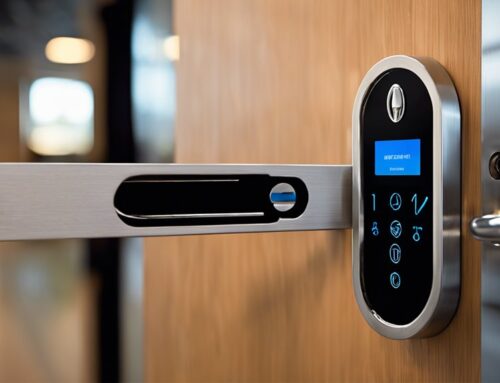In a world where car theft is an unfortunate reality, one device has emerged as a dependable safeguard for vehicle owners: the steering-wheel lock. This seemingly simple contraption, with its visible presence and immobilizing effect, serves as a powerful deterrent against would-be thieves.
From its humble beginnings in the early 1920s to its modern-day iterations, the steering-wheel lock has withstood the test of time. In this article, we will delve into the history, functionality, and benefits of using steering-wheel locks, while also exploring their limitations and offering tips for choosing the right one.
Prepare to fortify your vehicle’s security and ensure peace of mind with this essential tool.
History of Steering-Wheel Locks
Steering-wheel locks have been used since at least the early 1920s, with patents for them being filed in 1916. The evolution of steering-wheel locks has had a significant impact on car theft rates.
In the early days, steering-wheel locks were a visible anti-theft device that immobilized the steering wheel of a car. The first generation consisted of a lockable bar connecting the steering wheel to the brake pedal or clutch pedal. Later models extended over the dashboard, preventing the steering wheel from being turned.
When steering column locks were introduced in the 1970s, crime rates reduced significantly. However, it is important to note that steering-wheel locks have limitations and vulnerabilities, as they can be defeated by cutting the lock or the steering wheel.
Despite this, they remain an essential part of vehicle security systems, providing a visible deterrent to potential thieves and helping to reduce car theft rates when used in conjunction with other security measures.
How Steering-Wheel Locks Work
When engaged, this anti-theft device immobilizes the movement of the car’s steering mechanism, effectively preventing car theft. Steering-wheel locks come in various types, each with its own level of effectiveness in deterring thieves.
Here is a comparison of different types of steering-wheel locks:
- Traditional Bar Lock: This lock attaches to the steering wheel and either the brake pedal or clutch pedal, preventing the wheel from being turned. While it provides a visible deterrent, it can be defeated by cutting the lock or the steering wheel.
- Extendable Lock: These locks extend over the dashboard, making it impossible to turn the steering wheel. They are more secure than traditional bar locks, but can still be vulnerable to cutting.
- Electronic Lock: This type of lock requires a code or key to unlock and release the steering wheel. They offer a higher level of security but may be more expensive.
Overall, steering-wheel locks can be an effective tool in preventing car theft when used in conjunction with other security measures.
Benefits of Using Steering-Wheel Locks
Using a visible anti-theft device like a steering-wheel lock can help deter potential thieves and protect a vehicle’s contents.
Steering-wheel locks offer several advantages in terms of vehicle security. Firstly, they provide a visible deterrent, making thieves think twice before attempting to steal a car. The effectiveness of steering-wheel locks lies in their ability to immobilize the steering wheel, preventing it from being turned. This makes it extremely difficult for thieves to drive away with the vehicle.
Additionally, steering-wheel locks are relatively easy to install and use, making them accessible to a wide range of car owners. However, it is important to note that while steering-wheel locks can be effective, they are not foolproof and can be defeated by cutting the lock or the steering wheel.
Therefore, it is recommended to use steering-wheel locks in conjunction with other security measures for maximum protection.
Common Limitations of Steering-Wheel Locks
One of the limitations of this anti-theft device is that it can be easily defeated by cutting the lock or the vehicle’s steering mechanism. While steering-wheel locks serve as a visible deterrent and can be an effective tool in reducing car theft rates, they are not foolproof.
In order to provide maximum protection for vehicles, it is important to consider alternative anti-theft devices that can complement the effectiveness of steering-wheel locks. Some alternative options include:
- GPS Tracking Systems: These systems allow vehicle owners to track the location of their vehicles in real-time. They provide an added layer of security by enabling quick recovery in case of theft.
- Immobilizers: These devices prevent the engine from starting unless a valid key or electronic code is detected. They effectively immobilize the vehicle and make it difficult for thieves to hotwire the car.
- Alarm Systems: These systems emit a loud siren or alert when unauthorized access or tampering is detected. They not only deter thieves but also alert nearby individuals to the potential theft.
Tips for Choosing the Right Steering-Wheel Lock
A crucial factor in selecting the appropriate anti-theft device is considering the level of visibility it provides to potential thieves.
When it comes to steering-wheel locks, their visibility is one of their key features. These locks are designed to immobilize the steering wheel of a car, acting as a deterrent to thieves.
There are different types of steering-wheel locks available, such as the lockable bar connecting the steering wheel to the brake pedal or clutch pedal, and the models that extend over the dashboard, preventing the steering wheel from being turned.
However, it is important to note that proper installation is essential for their effectiveness. Steering-wheel locks should be installed correctly to ensure maximum security.
Additional Security Measures for Vehicle Protection
To enhance vehicle protection, it is recommended to employ additional security measures in conjunction with a steering-wheel lock. These additional measures can greatly enhance the overall security of the vehicle and provide peace of mind to the owner.
Here are three important security measures to consider:
- Vehicle alarm systems: Installing a vehicle alarm system can deter potential thieves and alert nearby individuals to any unauthorized access or tampering with the vehicle. These systems typically include sensors that detect any attempts to break into the vehicle or tamper with its components, triggering a loud alarm to scare away intruders.
- GPS tracking devices: GPS tracking devices can be discreetly installed in the vehicle and provide real-time location information. In the unfortunate event of a theft, these devices can help authorities track and recover the stolen vehicle. They are especially useful for high-value or rare vehicles that are prime targets for theft.
- Secure parking: Choosing a secure parking location, such as a well-lit area or a monitored parking lot, can significantly reduce the risk of theft. Parking in a crowded or busy area can also deter thieves as they are more likely to be noticed and apprehended.
Frequently Asked Questions
How Effective Are Steering-Wheel Locks in Preventing Car Theft?
Steering-wheel locks are a widely used anti-theft device for vehicles. They serve as a visible deterrent to potential thieves and can be effective in reducing car theft rates. However, their effectiveness is not foolproof and they have certain limitations and vulnerabilities.
Steering-wheel locks can be defeated by cutting the lock or steering wheel. It is important to note that they should not be confused with steering column locks, which are standard on all modern cars and immobilize the steering column when the key is removed.
Can Steering-Wheel Locks Be Easily Bypassed or Defeated?
Steering-wheel locks, although a visible deterrent, can be easily bypassed or defeated by common methods. Potential thieves can cut the lock or steering wheel, rendering the device useless.
While steering-wheel locks serve as an essential part of vehicle security systems and can be effective in reducing car theft rates, they have limitations and vulnerabilities.
It is important to use steering-wheel locks in conjunction with other security measures for maximum protection. Understanding the pros and cons of using steering-wheel locks is crucial in ensuring the safety of vehicles and their contents.
Are Steering-Wheel Locks Compatible With All Types of Vehicles?
Steering-wheel locks are compatible with most types of vehicles, providing an added layer of security. The pros of using a steering-wheel lock include its visible deterrent effect, helping to protect the vehicle and its contents.
However, there are some cons to consider as well. Steering-wheel locks can be defeated by cutting the lock or the steering wheel itself.
When choosing a steering-wheel lock, it is important to select one that is compatible with the size and design of your vehicle’s steering wheel.
Can Steering-Wheel Locks Cause Any Damage to the Steering Wheel or Other Parts of the Car?
Steering-wheel locks, while serving as visible deterrents to potential thieves, can potentially cause damage to the steering wheel or other parts of the car if not used properly. Improper installation or removal of the lock may result in scratches or dents on the steering wheel. Additionally, forcefully turning the steering wheel with the lock engaged can cause damage to the steering mechanism.
It is important for car owners to follow the manufacturer’s instructions and exercise caution when using steering-wheel locks to avoid any potential damage.
Are There Any Alternatives to Steering-Wheel Locks for Securing a Vehicle?
When considering vehicle security, there are alternatives to steering-wheel locks that can be effective.
These alternatives include electronic immobilizers, which prevent the engine from starting without the correct key or code.
Another option is installing a tracking device, which allows the vehicle to be easily located if stolen.
Additionally, using a combination of alarms, security cameras, and secure parking can enhance the overall effectiveness of securing a vehicle.
It is important to choose a security system that suits individual needs and provides peace of mind.






